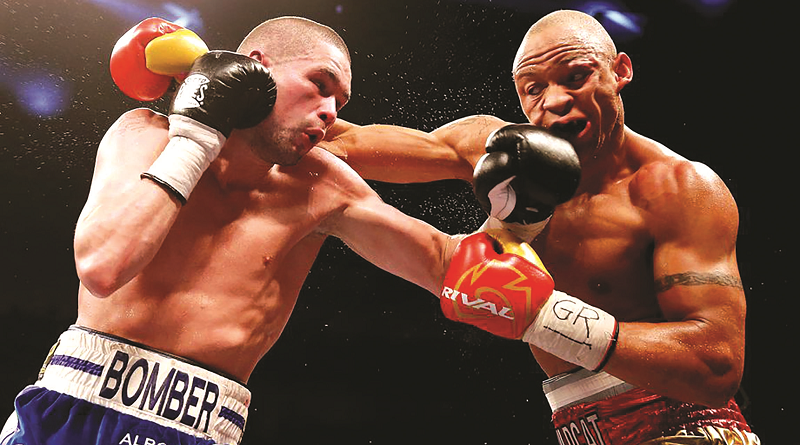BOXING HORROR: ATHLETES FOR HIV TESTING BEFORE BOUTS
By Tiwonge Kampondeni
For a predetermined set of time, two people are allowed to fight with fists and throw punches at each other. There is a lot of contact and usually they wear padded gloves as a way of reducing cuts and broken bones.
However, that does not stop them from cuts and bleeding, a scenario that exposes the athletes to diseases and viruses that are transmitted through body fluids and body contact.
Bloody games like boxing and other contact games including judo, netball or football have of recent times raised safety concerns of athletes especially in the wake of HIV and Aids.
Though some sporting activities have guidelines that demand an athlete to go through a medical checkup to be declared fit before any game or bout, locally, the guidelines seem not to be inclusive.
In boxing, it has been revealed, there is some recklessness. Most boxers do not go through thorough checkups and no one seems to care. Some boxers only go for brain and heart checkup. Very few do blood screening.
They might be ruthless and daring in their act once in the ring, but boxers are humans and love their life too. Wilson Masamba, one of Malawi’s few veteran boxers reflects on the bouts he has fought and cannot hide his concerns.
“I have fought without being tested before. And even my opponents were not tested. I think that was five years ago,” says Masamba, who has had to suffer upper cuts in his time while inflicting the same on his opponents.
He recalls that not even his promoters and organizers of the bouts initiated for HIV or hepatitis scree-ning. Over the years Masamba has realized how reckless it was on his part to accept fighting without knowing his and his opponent’s HIV status.
Masamba cannot believe he has had to expose himself and his opponents to life-threatening infections.
“I no longer fight without thorough screening. I also take a step further to ensure that my opponent is also tested and certified fit. Promoters might not pay attention to the boxer’s HIV status but this should be taken seriously by the boxers themselves. It is their life and they need to protect themselves,” hinted Masamba.
Echoing Masamba’s sentiments, National Council of Sports Administration Manager Henry Mereka says the best way would be to sensitize and educate athletes so that they initiate thorough medical checkups before going into any activity. He says locally HIV testing for athletes is not compulsory.
At international scene, in bouts sanctioned by World Boxing Federation, a boxer is supposed to go for blood test for HIV, hepatitis B and C within 30 days of the fight. The boxer will be declared fit after acceptable negative HIV test and an acceptable negative hepatitis test.
“We don’t have a policy restricting boxers to go for HIV, TB, hepatitis screening before a bout locally. What I know is that boxers go for a general checkup like heart and brain scan, and they are also assessed on fitness to see to it that they can stand the heat in the ring and last for all rounds.
“This is tricky and dangerous because one might still be fit physically while HIV positive, or has hepatitis or they might have TB, which is a risk to the opponent,” observes Mereka.
Mereka says compulsory HIV testing in sports is something they have been contemplating about but several factors have prevented them from effecting it. Some of the factors include the fear by athletes themselves to get tested, the lack of capacity by responsible bodies and ethical issues.
“We cannot force the athletes to go for HIV testing and other tests. It is a very big challenge because even when we are to do doping tests athletes are not comfortable.
“In an ideal situation, athletes in all sporting activities that have body contact needed to be going through HIV, TB and hepatitis screening. This is not discrimination but a way of protecting the athletes from infecting each other,” says Mereka.
Malawi Boxing Association of Malawi (MABA) president Justice Katika says it is a must that boxers go for medical checkups including HIV and hepatitis screening. He was, however, quick to say that some may want to skip the screening for their reasons.
“We have cancelled bouts before after one of the boxers was found to be HIV positive. It’s not discrimination but there is need for boxers to be protected,” he says.
Katika observes that in recent years they have been experiencing very low turn up of interested young boxers for fear of being infected with the virus.
“They view the sport as an easy way of getting infected. Some of the young boxers have even confided in us that their parents are not comfortable for them to join boxing because of the fear of injuries,” he said.
Katika says safety measures are being taken to protect athletes although some promoters try to skip some medical procedures.
“We have penalties for those who flout procedures. If a promoter allows a boxer who has not been tested to fight, he can be banned for life,” he says.
Malawi’s international light heavy weight boxer Miguel Isaac Chilemba confirmed in an interview from South Africa, where he is based, that he has been involved in bouts before without being tested.
“I remember before turning professional, I would just fight. No one was there to tell me that I should go for testing. It scares me when I think of that and my appeal to authorities in Malawi is that they should make HIV and other blood screening compulsory just like other countries are doing,” he says.
Charles Nyirenda, Malawi’s reno- wned sports analyst, said primarily boxers need to take a leading role in having their blood screened.
“Out there, HIV testing is not optional among athletes. Boxers and even footballers go for HIV testing. It is meant to protect athletes. You can’t go into a bout without being tested,” he says.
Mereka thinks it is a chicken and egg situation because on the other hand athletes need to be ready to make their HIV status public. Unless both the Council and the athletes take bold steps to address the situation, boxers will continue to walk in the shadow of a silent killer that could easily be dealt with through mere screening.



1,555 thoughts on “BOXING HORROR: ATHLETES FOR HIV TESTING BEFORE BOUTS”